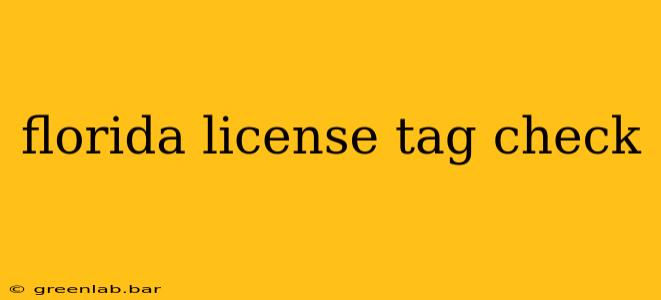Finding information about a Florida license plate might seem like a simple task, but navigating the various resources and understanding the limitations is key. This guide provides a comprehensive overview of how to perform a Florida license tag check, covering legal considerations, available resources, and what information you can expect to find.
What Information Can You Find with a Florida License Plate Lookup?
The information accessible through a Florida license plate lookup varies depending on the source and your relationship to the vehicle. Generally, you can expect to find some or all of the following:
- Vehicle Year, Make, and Model: This basic information is usually readily available.
- Vehicle Identification Number (VIN): The VIN is a unique identifier for the vehicle.
- Registered Owner's Information: Access to this is often restricted due to privacy concerns. Depending on the source and your justification, you may be able to find the owner's name and address, but this is not guaranteed and often requires legal authorization.
- Registration Status: Whether the registration is current, expired, or suspended.
- Insurance Status: This isn't directly available through a license plate lookup but may be accessible through other means if you have a legal reason to request the information.
How to Perform a Florida License Plate Check: Methods and Limitations
Several methods exist for conducting a Florida license plate lookup, each with its own limitations:
1. Using the Florida Department of Highway Safety and Motor Vehicles (FLHSMV) Website:
The FLHSMV website is the official source for vehicle registration information in Florida. However, accessing detailed owner information directly through their site is generally restricted to law enforcement and individuals with a legitimate need (e.g., a court order). You can usually verify registration status and possibly obtain basic vehicle information. Look for their online services portal for license plate-related queries.
2. Using Third-Party Websites:
Numerous third-party websites offer license plate lookup services. However, exercise caution when using these services. Verify their legitimacy and read their privacy policies carefully. The information they provide may be limited or inaccurate, and some may charge a fee. Furthermore, the legal implications of accessing personal information through these sites should be considered.
3. Contacting Law Enforcement:
If you have a legitimate reason to obtain detailed information about a vehicle's owner (e.g., a suspected crime), contact your local law enforcement agency. They have access to extensive databases and can assist with your inquiry, respecting legal privacy protocols.
Legal Considerations and Privacy Concerns
It's crucial to understand the legal implications before conducting a Florida license plate lookup. Accessing personal information without a legitimate purpose is a violation of privacy laws. This includes attempting to circumvent security measures or using unauthorized methods to gain access to restricted data.
Always adhere to Florida's privacy laws and regulations when pursuing information related to a Florida license plate. Misuse of information obtained through a license plate lookup can lead to legal consequences.
Conclusion: Responsible Information Gathering
Finding information using a Florida license plate lookup requires careful consideration of legal and ethical implications. While the official FLHSMV website is the best starting point, remember that access to sensitive owner information is limited to authorized individuals and entities. Always ensure your request aligns with legal requirements and respects the privacy rights of others. Using third-party services should be approached with caution, and legal counsel should be sought if you have questions or concerns.

